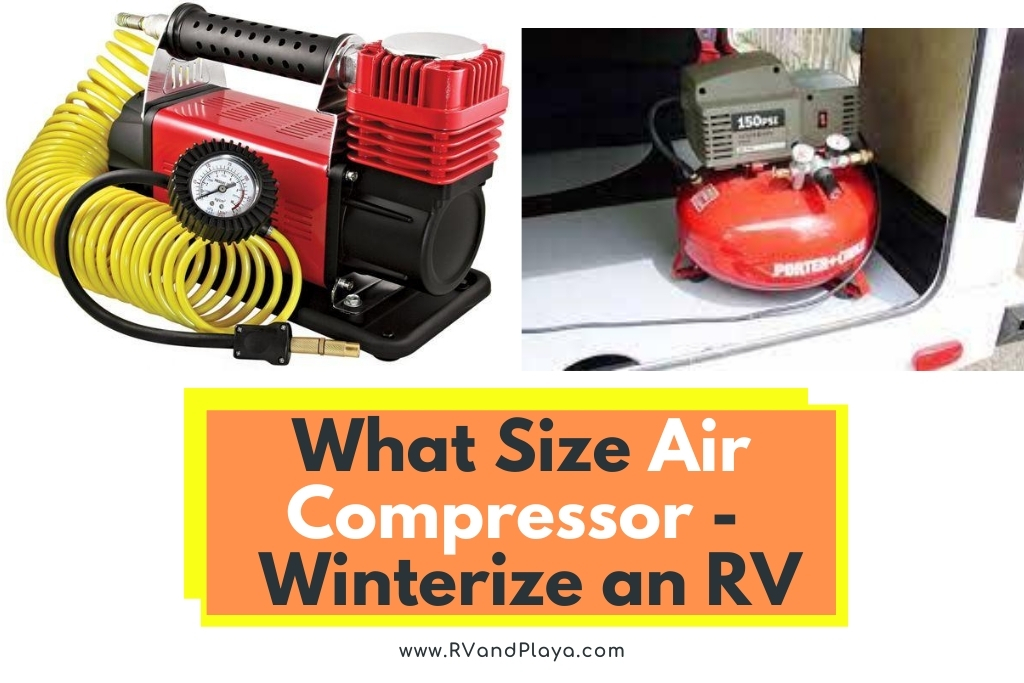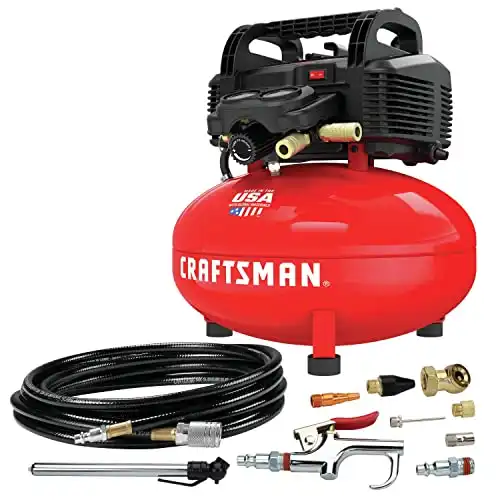One chore that many RV owners overlook, or put-off is winterizing their RV’s water system. The result is leaks, damaged water heaters, toilets, and expensive preventable repairs. There are several methods of winterizing your RV water system. One of the most popular is using compressed air to expel the water from the piping and other components. But what size air compressor do you need?
What size air compressor do you need to winterize an RV? The recommended air compressor size for winterizing an RV is a minimum of a 1-gallon tank size that will deliver at least 0.5 CFM of airflow. Airflow is the significant factor when using compressed air to purge your RV water system for winterizing.
Using compressed air to winterize your RV’s water system is a choice method when you plan to use your RV during the colder months. With the water purged from your water lines, tanks, and water heater, it is a simple matter to fill the holding tanks and get back on the road without having to drain and purge antifreeze from the system. We have compile some tips, tricks, and caveats about using compressed air.
Table of Contents
Coping with Cold Weather – The RV’ers Challenge
The problem with storing your RV during the cold winter months brings several challenges. The most susceptible system in your RV to cold weather is the water system. Every RV water system has components that are vulnerable to freezing and damage.
- Holding tanks
- Pumps
- Water lines
- Water heater
- Accessories such as ice makers or other appliances
- Valves
All these components are susceptible to holding enough water to freeze and cause damage. You must winterize your RV to remove this residual moisture to ensure that your RV water system stays damage free.
The consequence for failing to winterize your RV water system properly is leaking, damage to the RV, and expensive and time-consuming repairs.
Related reading: How to Prevent Travel Trailer or RV Pipes from Freezing?
Using Compressed Air – Do’s, Don’ts and the Don’t Forget’s
A small compressor can do an admirable job of purging your water system of residual moisture before storage during the winter months. However, performing the purge with compressed air needs to be done in a systematic way to ensure the water removal from the entire system.
- Do open all the faucets and drain the system from the lowest drain point available. Don’t forget to flush the toilet to remove any water it might be holding and any outdoor showers or outlets. Your owner’s manual will point you to the water system drain valve.
- Do bypass the water heater. If your water heater doesn’t have a factory-installed bypass valve, consult the owner’s manual for the proper procedures for compressed air draining.
- Don’t forget the ice maker in the refrigerator, your washing machine, or dishwasher. Follow the manufacturer’s instructions for winterizing these appliances separately.
- Don’t connect the air compressor to the water tank on your RV. Do Connect the blow-out plug to the city water connection on your RV. If you don’t have a blow-out plug, they are available at most RV supply stores or you can build your own.
- Do turn your air compressor down to 30-35 PSI. Using a lower pressure ensures that you won’t damage the water system in your RC and will deliver more airflow from your compressor.
- Do turn off all but one faucet in your RV. If possible, start with the faucet with the highest outlet, such as the shower. Let the air blow through the outlet until only air is coming out.
- Do work systematically. Open the next highest faucet and then close the one that you just purged. Always having at least one faucet open will prevent you from over-pressurizing the water system accidentally.
- Do flow air through the system until all evidence of any residual water is gone.
- Do leave the last faucet open until you turn the compressor off.
- Do close all the faucets
- Do drain the water heater and tank according to the manufacturer’s specifications.
- Don’t forget the other appliances in your RV, such as the ice maker, dishwasher, or clothes washer.
Following a few simple steps using a compressor to winterize your RV system, when appropriately done, leave your piping and other system parts, free of water.
This avoids a freezing hazard without having to pump antifreeze into the system. It is much more convenient to purge the system with compressed air than having to pump the antifreeze out and clear the system.
Related reading: Does RV Antifreeze Go Bad? Shelf Life of Antifreeze
What To Consider When Choosing A Compressor for Winterizing Your RV?
Almost any compressor will work to winterize an RV water system. The primary considerations when choosing a compressor for winterizing your RV water system are:
- Airflow
- Output Pressure
- Filtration and air quality
1. Airflow – More is Better
Airflow is more important than air pressure. Without enough airflow, the air may remove most of the water in the system, but at some point, the air will flow past any water remaining in the lines and leave the moisture in the system.
When choosing an air compressor that you will use to purge your RV water system, it should be capable of delivering at least 0.5 cubic feet per minute of airflow at 30 to 35 pounds per square inch of pressure.
Most small pancake or horizontal tank home compressors will provide this kind of airflow without a problem. A one-gallon pancake compressor that runs on 110 volts AC can easily winterize your RV and can provide enough capacity to fill tires if necessary.
2. Output Pressure – Don’t Cause Yourself More Trouble
Most home and hobby air compressors of this size will have an adjustable regulator. Many have two gauges. One gauge reads the air pressure in the air tank on the compressor and the other indicates the outlet pressure. Don’t get these two confused or you can easily damage your RV water system by over pressuring the lines and tanks.
The outlet pressure should be set to between 30 – 35 pounds per square inch when winterizing your RV water system. These pressures should be well under the pressure limits for your water system.
3. Air Filtration and Quality – Keep the Bad Stuff Out
Remember that you are dealing with your potable water system. This system contains the water that you may be drinking and using for cooking. You want to be sure that the air you are putting down your RV water system doesn’t contain oil or other substances.
Small compressors come in two types. One contains oil that lubricates the compressor as it works. The other type, known as oil-less compressors, use unique sealing rings in the compressor and not oil for lubrication.
It would be best if you opted for an oil-less compressor to ensure that you aren’t pumping small amounts of lubricating oil into your RV water system.
Compressor Size – Going Big or Going Small
Small home compressors are widely available online and from home improvements stores. The prices range from under $100 to above $300 depending on the manufacturer and the features included with the compressor.
If you mainly use the compressor for small jobs such as topping off the air pressure in your tires and winterizing the water system in your RV, the budget end of the compressor lineup should perform everything you want to accomplish.
One upside to these compressors is their portability, making them easier to pack into your RV.
Will a 12-volt Compressor Work?
With very few exceptions, the portable 12-volt tire inflators will not deliver enough sustained airflow to do an effective job of winterizing your RV water system.
The small diaphragm or piston-type pumps that these portable tire inflators use and deliver adequate pressure to air up a tire, but not enough flow to move the water out of the water lines.
Getting Set for Winter – Keeping that RV Ready
Winterizing your RV’s water system using compressed air is a great way to minimize the risks of damage from cold and freezing weather.
Related reading:How to Choose the Perfect Cover for Your Travel Trailer [Read This First]
The added advantage of not having to purge to the antifreeze from the system means that you can use your RV during the winter months with much less effort. RVing is all about using that trailer or motorhome, so get it set and get on the road.
My Recommendation:
I’m sure there are lots of good RV Air Compressor and I haven’t done a head-to-head test or anything, but the one I ended up buying is this CRAFTSMAN RV Air Compressor and I’m happy with it. It not only fits all of those criteria, it’s half the cost of what comparable RV Air Compressor sell for at Camping World (the local RV place here in Meridian, Idaho).
Purchase: If you are interested in CRAFTSMAN RV Air Compressor then just follow the link to Amazon where you can see current pricing.
+ Great Value
+ Durable, oil free pump for long life
+ Easily starts up in cold weather
+ 1 year limited warranty
How to winterize RV water system with compressed air >> Check out the video below:
Recent Posts
Is Toyota Remote Connect Free? (Subscription, Services Plans)
Does Toyota Remote Connect have an included trial? It used to be the case that, when you bought a new car, you made one straightforward payment and that was it. Now, it feels like there are...
Toyota Safety Connect: What It Is And Why You Need It? Whether you’re buying a new Toyota or you’ve had one for a while you will have been given the hard sell on their Connected Services but do...



